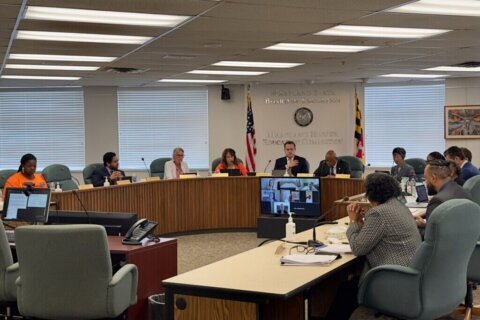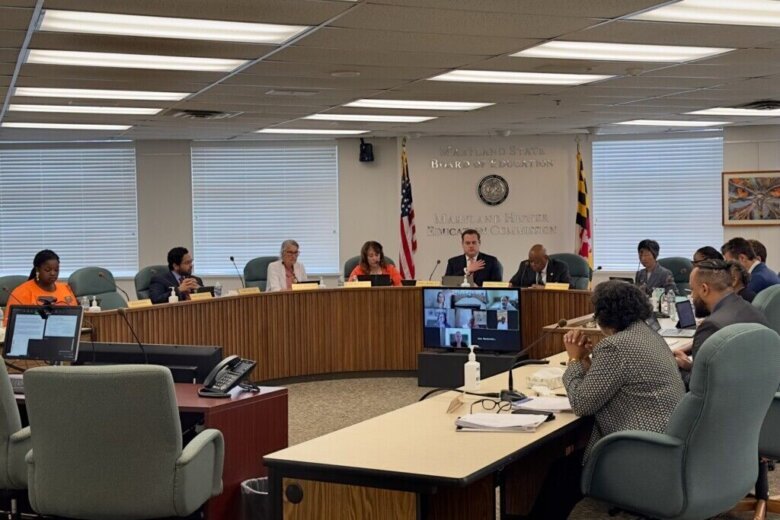
The Maryland State Board of Education will continue deliberating whether to offer a new four-year contract to the state superintendent of schools.
The board could have approved a new contract for Superintendent Mohammed Choudhury on Tuesday.
Instead, Board President Clarence Crawford said, in a brief statement after a closed meeting, that the board “will continue the process outlined in its governance manual regarding the appointment of the superintendent. When it is appropriate, the state board will make a public statement on the process.”
Choudhury’s current contract of $310,000 expires June 30, 2024, and began two years ago, when he replaced former superintendent Karen Salmon.
If a new contract is extended, it would be expected to be finalized at the board’s regularly scheduled September meeting, according to the board’s governance and operations manual.
Choudhury wasn’t in attendance in Baltimore on Tuesday.
Choudhury’s contract is under consideration by a board that includes five new members who participated in their first meeting Tuesday: former Prince George’s County Public Schools CEO Monica Goldson; Nicholas Greer, principal consultant and founder of NAG Solutions LLC; Irma Johnson, a former schools administrator in Baltimore; Samir Paul, an attorney and a former teacher; and high school student Abisolya Ayoola.
Choudhury, who came to Maryland after working as associate superintendent of strategy, talent and innovation at the San Antonio Independent School District in Texas, has received national recognition for his efforts on economic integration of schools.
Although he’s received some praise in his two years in Maryland for analyzing data, decreasing staff vacancies and a push to help local school systems hire teachers from their community, Choudhury has also been criticized by some state lawmakers and former employees on his leadership style and lack of collaboration with some advocates.
Robert Eccles, a former high-level education official who left the department last year, has testified before the board this year requesting a third-party investigation into Choudhury’s direction of the state agency, alleging intimidation and harassment of former staff.
Eccles said an example of Choudhury’s failed leadership includes the return of an $844,000 federal Perkins grant that was to be put toward career and technical education programs. Since the money wasn’t used in a certain timeframe, it had to be returned to the federal government.
“There has been no outreach to former staff members such as myself, or senior leaders who departed major roles, or to current employees who report ongoing chilling leadership practices,” he said Tuesday. “An independent investigation is long overdue, and is necessary to either vindicate MSDE’s current administration or safeguard current employees and the public for reckless agency that inevitably jeopardizes the full implementation of the Blueprint [for Maryland’s Future education reform plan] and the educational futures of our children.”
Crawford, a staunch supporter of Choudhury, asked a few questions to Sylvia Lawson, deputy state superintendent for organizational effectiveness.
“Does the superintendent meet with people alone?” Crawford said.
“Mr. Choudhury does not meet with individuals alone. He has always advocated for what he calls ‘a buddy system,’” Lawson replied. “So that means whenever Mr. Choudhury has meetings, I am involved in those meetings to take notes and to go back at many times and share those to the individuals in those meetings, and to make sure that whatever it is that is covered, is brought back and we accomplish whatever it is we set out to do in those meetings.”
Crawford asked Lawson if she’s seen “certain behaviors” Choudhury’s been accused of, which include micromanagement and creating a toxic work environment.
“I have absolutely not, especially in some of the most recent accounts of what has been stated in the press,” she said.
Meanwhile, Choudhury has said he wants to continue work on several projects, such as the Blueprint for Maryland’s Future education reform scheduled for full implementation by 2032.
The Blueprint’s Accountability and Implementation Board, which oversees the plan, could begin approving the first submission of local school systems’ plans Thursday.
The approval process could’ve started in May, but miscommunication between the accountability board and the Department of Education became public when department officials sought more time to offer recommendations on local school system reform plans. Some officials said it created a “two-step” process in which both agencies would receive and review the same documents, potentially duplicating efforts and lengthening timelines.
However, some Blueprint supporters said the process slowed down when former Gov. Larry Hogan (R) vetoed the Blueprint legislation in 2020. Lawmakers overrode Hogan’s veto a year later in 2021.
William “Brit” Kirwan, the vice chair of the accountability board who led the reform effort for years, said earlier this month on WYPR-FM that the most recent fiscal year, which ended July 1, was the first year the board’s work was fully funded.
“The fiscal year (2023) that just ended is really the first full implementation of the Blueprint,” he said. “Because Gov. Hogan vetoed the original passage of the Blueprint, we are a year behind where we thought we would be with the implementation.”
Also on Tuesday, the State Board of Education voted unanimously for Crawford to remain as president and chose Joshua Michael to serve as vice chair. Michael, a former teacher and executive director of the Sherman Family Foundation, joined the board earlier this year after appointed by Gov. Wes Moore (D).








